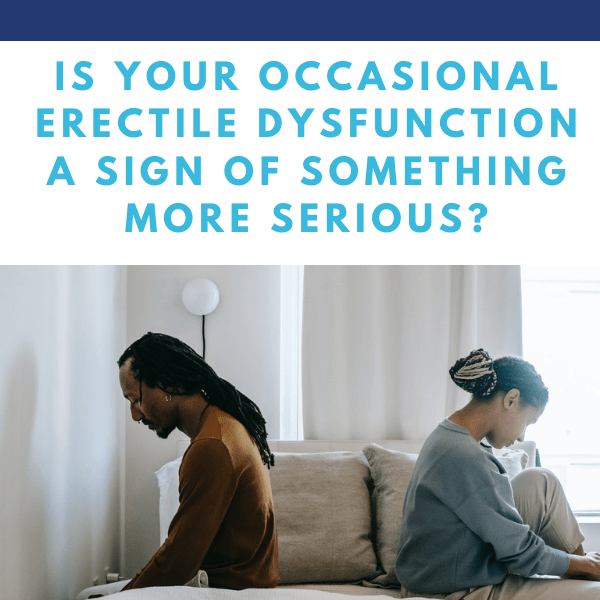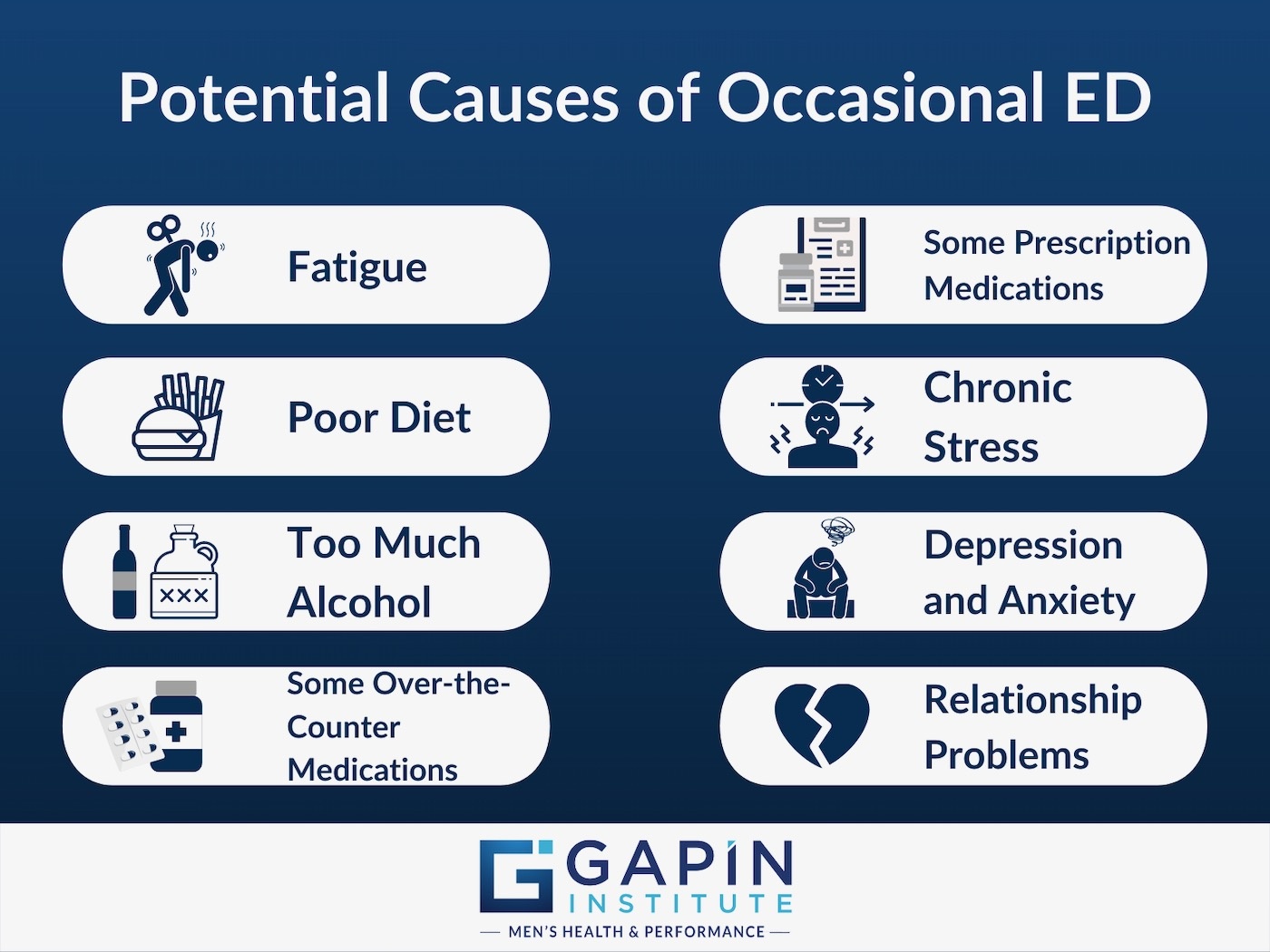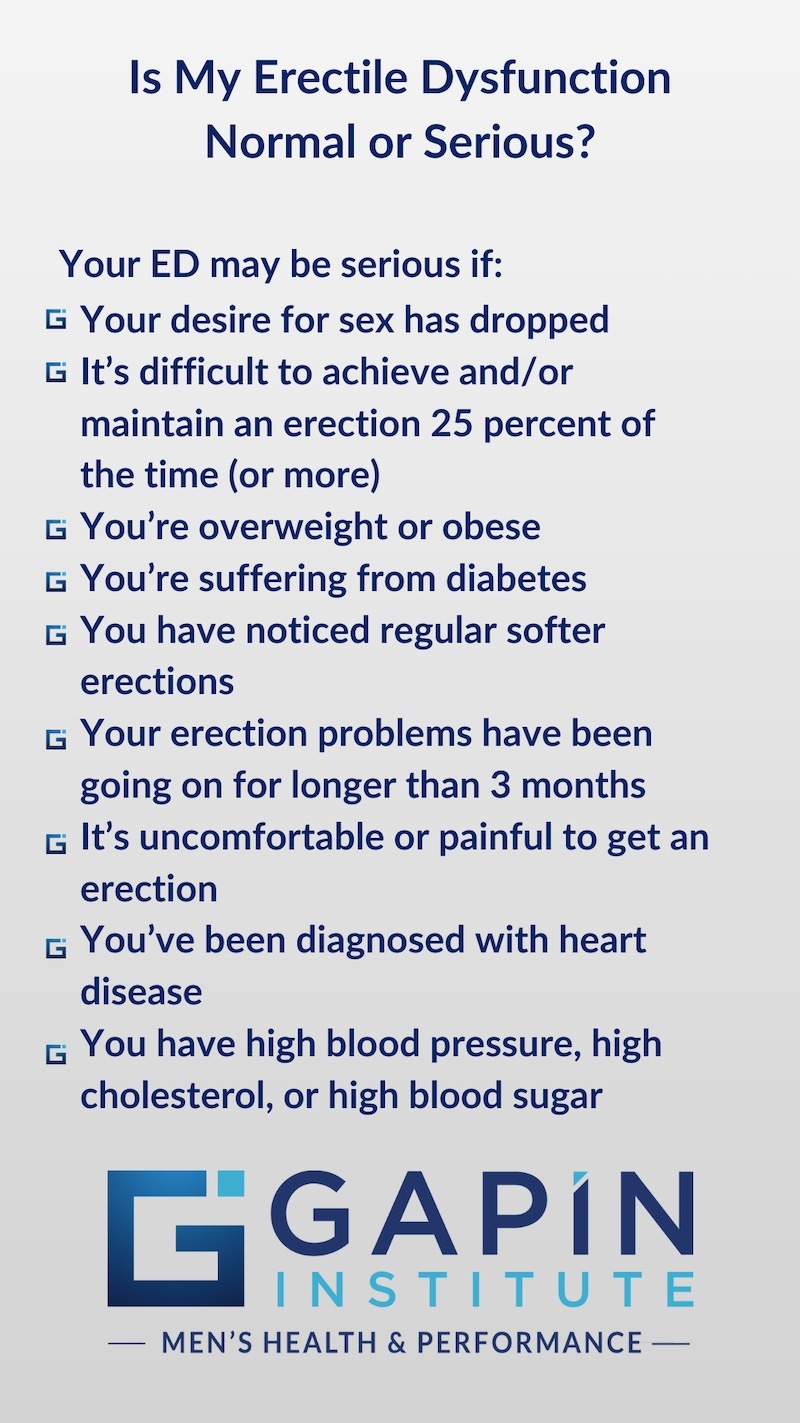Are you a victim of occasional erectile dysfunction…or is something else going on?
Every man experiences erectile dysfunction at some point or another during his lifetime. But if it happens more than once or twice, you may start to worry.
Is this something serious?
Is Occasional Erectile Dysfunction Normal?
A lot of factors—including mood, stress, and fatigue—can affect your ability to achieve and maintain an erection, and sometimes those factors are working against you.
If you’ve been going through a particularly stressful period, for instance, working a lot of hours, or dealing with an illness, you may notice troubles in the bedroom too.
As far as what is “normal,” that can vary from person to person. The Cleveland Clinic states that a failure to get an erection less than 20 percent of the time is “not unusual and typically does not require treatment.”
Also called “situational erectile dysfunction,” occasional ED occurs only intermittently and is dependent on the situation. It’s never comfortable and can rattle your nerves, but often there’s no need to be overly concerned.
What’s the Difference Between Occasional Erectile Dysfunction and ED?
Sometimes, though, ED is a true medical condition that requires your attention because it’s often a sign of other health problems that need to be addressed.
How can you tell whether what you’re experiencing is normal or not?
The Cleveland Clinic defines ED as a failure to achieve an erection more than 50 percent of the time. But it’s not wise to wait until you’re having that much trouble.
I recommend talking to your doctor if you’re noticing trouble more than 20 percent of the time. In most cases, that’s a sign that something else is going on and we need to find out what it is for your health and your future.
“ED is common with age,” they’ll tell you, and it’s true that older men are more likely to be diagnosed. But that doesn’t mean you should just live with it if you’re over a certain age.

How Prevalent is Erectile Dysfunction?
Studies vary on how common ED is across the population. A 2018 review estimated it affects about one-third of men, with the prevalence increasing with age as well as with the number of risk factors present. These included cardiovascular disease, a sedentary lifestyle, and endothelial damage. (Endothelial cells line blood vessels, and if they become damaged, can lead to blood flow problems.)
Another review found that worldwide, the prevalence of ED ranges between 3 and 76.5 percent. Again, ED was associated with increasing age and with cardiovascular disease.
It’s not just older men who may struggle with ED, however. According to a 2013 study, about one in four (25 percent) of men seeking help for new-onset ED were younger than 40 years.
Indeed, ED can happen to anyone at any time. Yet it’s not something to just brush off as a “normal” part of aging. According to the review above, men with ED have an increased risk of all-cause mortality (death) as well as death from cardiovascular disease. They are also more likely to have benign prostatic hyperplasia (BPH) than men without ED and are 1.68-times more likely to develop dementia.
Fortunately, with a careful medical examination and treatment, you can avoid these undesirable outcomes.

What Causes Occasional Erectile Dysfunction?
Occasional or situational erectile dysfunction may be caused by the following factors:
Fatigue
Fatigue can easily decrease your desire or even energy for sex. If you try anyway, you may not be able to achieve an erection.
Too Much Alcohol
Alcohol is a natural depressant and is a common culprit in cases of situational ED. Though you may be fine with a drink or two, if you overindulge, it can depress your sexual response.
Stress
When you’re stressed out, your body releases hormones that can interfere with an erection. Worse, if you experience one failed erection, you may feel stressed about the next one, compounding the problem.
Drugs
Many common medications, including antihistamines, some blood pressure drugs, prescription pain relievers, sleep aids, antidepressants, and others, can cause short-term ED as a side effect. Recreational and illegal drugs can also suppress the nervous system, causing situational ED.
Relationship Problems
Poor communication, unresolved anger, and other issues can interfere with your ability to enjoy a pleasant sexual encounter with your partner.
Depression
If you’re feeling depressed or even just down at the moment, it can affect your nerves and your ability to achieve an erection.
How to Address Occasional Erectile Dysfunction
If you’re experiencing occasional erectile dysfunction, you can usually address it with a few careful lifestyle changes:
- Make sure you’re eating healthy foods.
- Reduce your stress.
- Exercise consistently.
- Stop smoking, and limit alcohol use.
- Seek treatment for depression, anxiety, and other mental health concerns. If you’re having relationship issues, consider couples counseling.
- If you’re taking prescription medications, ask your doctor if any may be contributing to ED.
What Causes Medically Diagnosed Erectile Dysfunction?
Medically diagnosed ED is often related to a physical health issue. That’s why it’s so important to talk to your doctor about it as soon as you can.
Cardiovascular Disease
A successful erection relies on proper blood flow. If blood flow is slowed or stopped because of narrow or blocked blood vessels, there won’t be enough blood flowing into the penis to maintain an erection.
As we age, it’s more common to suffer from narrowed and stiffened blood vessels. Over the years, a hardened plaque made up of cholesterol and other materials can build up inside them. That can affect not only heart health but sexual health as well.
ED and cardiovascular disease are closely related. In a 2018 study, researchers stated, “Increasing evidence suggests that ED is predominantly a vascular disorder.” An earlier study also found a confirmed link between ED and cardiovascular disease (CVD) and noted that ED is a sign of increased risk of CVD.
Obesity
Obesity increases the risk of ED. That’s because it can damage the blood vessels, decrease testosterone, and create systemic inflammation in the body. In a 2008 study, researchers found that overweight and obesity could increase the risk of ED by 30-90 percent.
They also found that men with ED tended to be heavier and with a greater waist circumference than those without ED, and were also more likely to have high cholesterol and high blood pressure.
Diabetes
ED is known to be a potential complication of diabetes—again, because diabetes, when not properly treated, can damage blood vessels. In a 2014 study, scientists noted that diabetes is an “established risk factor for sexual dysfunction in men,” adding that those with diabetes had a three-fold increased risk of ED.
Sleep Disorders
Sleep disorders like sleep apnea, when untreated, can rob men of the critical sleep they need every night, leading to other health problems down the road, including ED.
After examining 150 patients with sleep apnea, scientists reported that over half of them had ED. Fortunately, treatment with continuous positive airway pressure (CPAP) helped improve erectile function and sexual satisfaction.
Neurological Disorders
Parkinson’s disease, multiple sclerosis, Alzheimer’s disease, and other types of neurological diseases can interfere with the nerve impulses sent to the penis. The nerves may become damaged from these diseases to where they no longer function as they should.
In a 2016 study, researchers found that the occurrence of ED was “significantly more prevalent” among men suffering from neurological conditions.
Smoking
Smoking is horrible for your health, including your sexual health. In addition to increasing your risk of coronary artery disease and lung cancer, it can also increase your risk of ED. That’s because it can damage the lining of your blood vessels, affecting the way they function, while also potentially damaging the nerves leading to the penis.
When researchers reviewed data from 860 male patients between the ages of 18 and 44, they found that heavy smoking was a risk factor for ED, particularly for younger men. And when examining data from over 2,100 men, researchers found that compared with former and never smokers, current smokers in their forties had the greatest odds of suffering from ED.
Compared with men who never smoked, those who smoked at some time had a greater likelihood of ED, with those who smoked more having a higher risk.
Peyronie’s Disease
Peyronie’s disease—a condition that causes scar tissue to develop on the penis, creating curved, painful erections—is often associated with ED. In men genetically susceptible to the disease, ED may be an early sign of it.
Hormone Imbalances
Hormonal abnormalities—including low testosterone, thyroid issues and those caused by steroid abuse, can also cause ED.

Surprising Causes of More than Occasional Erectile Dysfunction
In addition to the causes listed above, some additional ones may surprise you.
Diet
It may be hard to believe, but your diet could be related to your ED! Indeed, the foods you eat affect your overall health, including your hormone balance, heart and blood vessels, weight, inflammation, and more.
Those most likely to increase the risk of ED include:
- Packaged, processed foods
- Fast foods
- Fried foods
- Animal meats (particularly animals given antibiotics and hormones)
- Salty foods
- Soy
- Alcohol
Find healthier alternatives to these in our post, “7 Foods Causing Your Erectile Dysfunction.”
Porn
Internet porn use has exploded over the past couple of decades, and it’s not helping men to enjoy healthy sex lives.
According to a recent study out of Italy, more and more young men, in particular, are suffering from ED because of Internet porn. Investigators surveyed 28,000 users and found that many started watching it as early as 14 years of age.
Scientists discovered that the effects were very harmful to young men’s developing sexuality. Over time, they experienced a drop in libido, which eventually morphed into full-fledged ED.
Indeed, porn can dampen sexual desire over time, while also affecting men’s self-esteem and expectations. In a 2016 review, researchers noted that Internet porn can condition sexual arousal that doesn’t readily transition to real-life partners.
Environmental Toxins
We’re exposed to more chemicals today than ever before in history. They’re in the air we breathe, the water we drink, the food we eat, and in our material goods (furniture, clothing, consumer goods), personal care products, and more.
Scientists are still learning about how these chemicals may affect us. They have already discovered, however, that they can increase the risk for ED. When studying nearly 200 men who sought help for ED, scientists found that exposure to environmental toxins like pesticides and solvents was a risk factor for ED.
3 Questions to Ask Yourself About Occasional Erectile Dysfunction
Think about your experience with ED for a moment, and ask yourself if you’re noticing the following more than occasionally:
- A reduced desire for sex
- Persistent or regular inability to achieve and/or maintain an erection (20 percent of the time or more)
- Softer erections
- Premature ejaculation
- Loss of sensitivity in the penis
- Stress related to these factors
If you’re not sure whether what you’re experiencing is normal or not, ask yourself:
- Has it been going on for longer than three months?
- Is it painful or difficult to get an erection, to the point that you’re feeling stressed about it?
- Do you have accompanying symptoms, like those related to heart disease or diabetes?
If you answered “yes” to even one of these questions, it’s time to talk to your doctor.
Solutions for Medically Diagnosed ED
Studies show that only about a quarter of men suffering from ED get help. I hope if you’re experiencing this, you won’t be one of them. There’s so much we can do now to help you feel better. There’s no reason for you to suffer in silence.
Remember that ED is often a sign of other, underlying health problems. We must find out what’s going on to prevent further complications down the road.
If your doctor does diagnose you with ED, you have many options for how to treat it. Unfortunately, in today’s world, men are often just given a pill and sent on their way. I think this is a huge mistake.
At the Gapin Institute, we recommend a systems-based approach that includes the following approaches.
Lifestyle Changes for ED
It’s always best to start with lifestyle changes, like those listed above for occasional ED. These can not only improve your sexual health but your overall health as well. Even if they don’t completely cure your ED, they can help reduce it or prevent it from getting worse in the future.
Medications for ED
Drugs like Viagra and Cialis have been important breakthroughs for men for one reason: they work. By increasing blood flow to the penis, they improve your ability to achieve and maintain an erection, and they can also improve sensitivity to sexual stimulation. They can help you enjoy sex once again, but they mustn’t be the only part of your approach.
A Full Health Evaluation
At the Gapin Institute, we conduct a full evaluation of your health condition to make sure we don’t have other issues we should be dealing with. Early detection of things like cardiovascular disease, diabetes, Peyronie’s disease, and more can mean the difference between a healthy, active future, and a diseased one.
Peptide Therapy for ED
Peptides are amino-acid-based molecules that perform many functions in the body. Some of them are directly connected to sexual function, while others are tied to hormonal function. If you’re not producing as many of these peptides as you need—which is common—a targeted treatment could help you feel like your old self again.
(Read more: 8 Reasons Why People Are Talking About Peptides for Men.)
GAINSWave Treatments
GAINSWave is a clinically proven, non-invasive therapy that improves sexual performance by releasing blood flow. It uses low-intensity sound waves to stimulate the growth of new, healthier blood vessels in the penis. As opposed to medications, it gets to the root cause of the problem and solves it. Plus, there are no harmful side effects.
Injections & Vacuum Therapy for ED
- The Priapus or P-Shot: This is a single-injection treatment that infuses the patient’s own blood products, including power growth factors and enriched platelets to help stimulate cellular and tissue repair in the penis. Like GAINSWave therapy, it helps to get at the root of the problem.
- Trimix Injections: These injections must be used every time you want to stimulate an erection. You inject them into the penis just before intercourse to promote increased blood flow.
- Vacuum Therapy: This is another treatment that must be used every time you need it. You place a cylinder-shaped suction device around the penis to draw blood into it. It’s non-invasive and effective.
If It’s More Than Occasional Erectile Dysfunction, Call Your Doctor Today
If you’re ready to talk to your doctor about ED, I recommend you:
- prepare a list of questions first
- make a note of whatever medications you’re taking
- jot down the symptoms you’re experiencing (and for how long)
- then take a deep breath and make that appointment!
Your sexual health isn’t just a nice-to-have extra in your life. It’s an important part of your overall health, as well as a barometer indicating how well you’re aging.
We all experience bumps in the road. With the right approach, you can smooth this one out and go on to enjoy many more vigorous, vital years.



